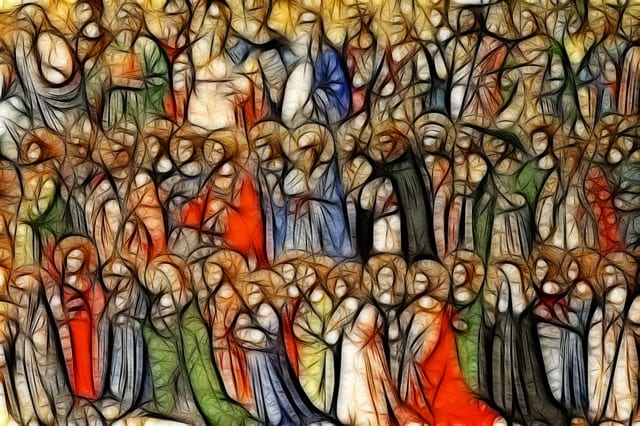
I want to say a little more today, here in the evening of the feast of Saints Peter and Paul, about the destruction or vandalization of Catholic religious statues, shrines and places of worship we’ve been seeing on the news just now, and all the people clamoring for more destruction. As a Catholic myself, I want to talk about how I think a Catholic ought to respond.
I see congregations getting together to clean up the damage, and that’s good.
I see a lot of people sad and angry, and I’m not saying we shouldn’t be sad and angry.
But I also see people making fun of the protesters who would do such a thing. I see a lot of contempt and even promises of violence toward these people. And when I see that, I think we need to back up a moment, and remember whom the saints we’re honoring really are.
As Catholics, we believe the saints are in Heaven, by the mercy of God.
That’s how you get to Heaven: by the mercy of God. That’s the only way anyone has ever gotten to Heaven. There’s a sign in the big beautiful church in downtown Steubenville that says “Saint Therese got to Heaven by doing little things for the love of God, and so can you!” and that’s actually not true. Saint Therese could never bribe her way into Heaven that way, and neither can we. Saint Therese got to Heaven by the mercy of God, and so can you. Her Little Way was revealed to her by the mercy of God. By the mercy of God she kept it up even as she slowly suffocated from tuberculosis. And by the mercy of God, you and I can follow the path revealed to each of us by God. By the mercy of God, God will perfect us in spite of our weaknesses. And by that same Mercy, we’ll persevere until the end and find ourselves where Saint Therese went.
Except for the Blessed Mother, you’ll never find a saint who was perfect in this life. No, not even your favorite saint (besides the Blessed Mother). I’m sure we can each name a saint we don’t like. As for me, if I ever found myself in the room with Louis De Montfort, I think I’d put a whoopee cushion on his chair and laugh at him, and I don’t like the Cure of Ars either. But they’re still saints. Some saints appear, in the light of history, especially problematic. I’m horrified by the child abuse that John Paul the Second was willing to ignore and cover up, and I’m angry at a lot of what Saint Monica’s known (or blamed) for. But they’re still saints, somehow. While on earth, they were sinners fumbling towards the mercy of God, horribly sometimes because we’re all horrible sometimes. But by the mercy of God, they’re home now. They’re in Heaven. That’s what canonization means: not that a person was perfect or unproblematic. Not that they never made a mistake. Not even that they never committed a grave sin. Canonization merely means that the Church declares they’re in Heaven by the mercy of God.
And when you’re in Heaven, you’re perfect.
They weren’t perfect on Earth, but they’re perfect now.
When you’re in Heaven– that’s when you become perfectly what you were meant to be on Earth. I’ll be perfect there and so will you.
What’s a perfect person like?
In the eyes of the world, a perfect person might be a financial success, or a mighty warrior who never missed a kill, or a model with a gorgeous body. But in Heaven, a perfect person is a person who loves perfectly. The saints in Heaven see as God sees and love as God loves, perfectly. They’re not deceived by the errors and bigotries and stupid notions of the world they lived in before they went to Heaven. They see everything perfectly. They see your intrinsic value and mine. They see the intrinsic value of the people whom they would have despised if they met them on earth. They see the Divine Image in everyone, and they love everyone perfectly.
In Heaven, the saints love with the same perfect, unselfish, earth-shattering, scandalous love that Christ had for us when He descended to Earth and became Man, submitted to earthly parents, preached the Gospel, accepted torture and execution and descended into hell. If it were possible and if it were necessary, any saint in Heaven would die for you in the same way– yes, you, the sinner reading this. They are one with Christ now, and they love as Christ loves. And you and I will be too, by the mercy of God.
Some people act like it’s appropriate to harp on their own failings and insist they’ll never be saints, but I think that’s wrong. I think, by the virtue of faith, we can recognize that there never was a human being who wasn’t called to be a great saint. And I think that, by the virtue of hope, we can trust that the mercy of God will make us saints, and by the virtue of love we can throw ourselves into that mercy without fear. By that mercy, if we let Him, God will make saints out of you and out of me.
I generally don’t believe in destroying images of saints. I don’t like defacing churches; I think that’s wrong. I wish that the people bent on doing that would stop.
But we have to remember: when a saint in Heaven looks down at a mob of angry people vandalizing a statute or a shrine or church dedicated to them, they’re not offended. Being offended by that would be pride, and saints don’t have pride anymore. They’re perfect. Saints have love, where they used to have pride. Saints look down at angry people and only think about how they can give help and justice to that person.
Oh, yes, love and justice are linked. Remember, real justice doesn’t mean going to jail. Justice means everyone getting their due. Justice means everyone gets what they’re meant to have. And humans, created in the image and likeness of God, are meant to be loved just as the Father loves the Son. We are meant to love one another, to serve one another and bear one another’s crosses. We are meant to cry out with a thousand tongues against the things that are the opposite of love– the demonic pride at the heart of racism and other forms of bigotry. The avarice and envy at the heart of systems that keep the many poor and needy for the sake of the comfort of the few. The wrath, envy, pride and avarice at the heart of war and state-sponsored violence. The lust and avarice that sees other people as tools for personal satisfaction rather than images of God. The acedia that tells us that “these are the times we live in” or “this is the best system we have” or “someone else will take care of that.”
That’s what love is.
No one, except Christ and Mary, ever loved perfectly in this life. We all love imperfectly, and by the mercy of God I pray that we keep repenting and loving better.
But every saint in Heaven loves perfectly now.
So, if you witness some vandalism or destruction at your church or at a shrine to a saint, maybe you’ll want to be part of the effort to clean up and rebuild. That’s a good thing to do. That’s great.
But as you are doing that, you should ask that saint to let you know what other mess she or he wants you to clean up. And you should get to work.
By the mercy of God, may we all get to work.
Image via Pixabay
Mary Pezzulo is the author of Meditations on the Way of the Cross.
Steel Magnificat operates almost entirely on tips. To tip the author, visit our donate page.













